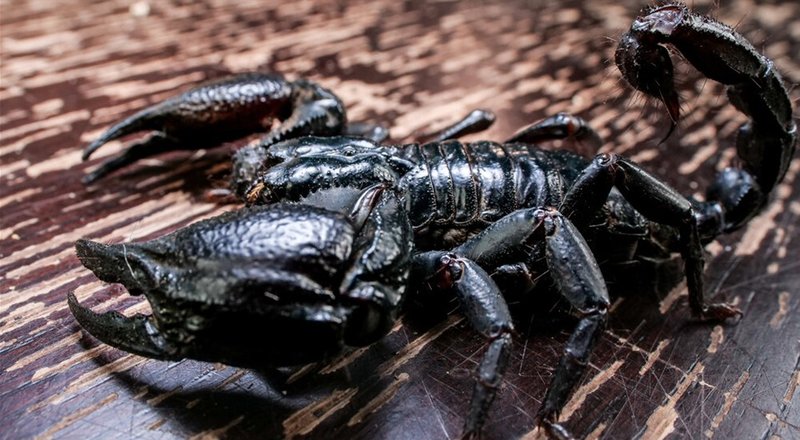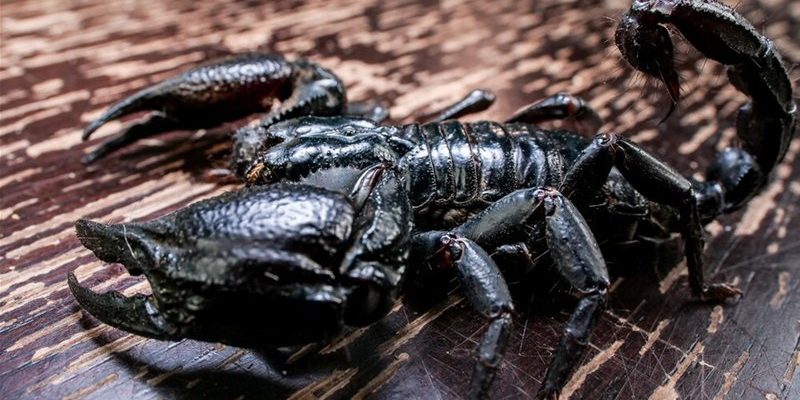
Imagine sitting across from a friend at a coffee shop, and they tell you a wild story about a scorpion that can take down a person with a single sting. It’s easy to get caught up in the panic and intrigue surrounding these creatures. Let’s dive into the facts, separate the truth from the myth, and explore what really happens when a human meets an Asian Forest Scorpion.
What Is the Asian Forest Scorpion?
The Asian Forest Scorpion (Heterometrus spinifer) is one of the largest scorpion species, boasting a body length of about 8 inches. Known for their striking appearance, these scorpions are often black or dark brown with a shiny, armored exoskeleton. They thrive in tropical and subtropical environments, primarily found in Southeast Asia, including countries like Thailand, Malaysia, and Indonesia.
These scorpions usually prefer moist, forested habitats where they can find shelter among rocks, leaf litter, and fallen logs. They’re nocturnal hunters, often hiding during the day and coming out at night to feed on insects and other small creatures. While they might look menacing, their behavior is more about surviving in their environment than actively seeking out trouble.
Here’s the thing: while their intimidating appearance can evoke some fear, understanding their nature is key to knowing how dangerous they truly are. Most people will encounter these creatures in nature or in captivity, like a pet in a terrarium. But the real question remains—how do they interact with humans?
How Dangerous Is the Asian Forest Scorpion?
You might be wondering just how dangerous these scorpions are. The *Asian Forest Scorpion* does possess venom, but it’s not as potent as some might think. While their sting can be painful and comparable to a wasp sting, it’s generally not fatal to healthy adults.
The venom contains a mixture of neurotoxins and enzymes that help them subdue their prey. However, for humans, the effects can range from mild to moderate. Symptoms can include localized pain, swelling, and redness at the sting site. In some cases, people may experience more severe reactions, especially if they have allergies or pre-existing health issues.
So when it comes to thinking about their danger level, the Asian Forest Scorpion is more of a nuisance than a killer. To put it in perspective: just like how most house cats can scratch you, but they rarely harm anyone severely.
Can They Kill a Human? The Myths Debunked
Now, let’s address the heart of the matter: can the Asian Forest Scorpion actually kill a human? The short answer is no—healthy adults are generally safe. There are very few documented cases of fatalities attributed to their sting. Most serious reactions happen among young children, the elderly, or individuals with compromised immune systems.
A lot of the fear surrounding these scorpions comes from sensational stories and urban legends. Think about it: why do we love horror movies? They play on our fears, even if they’re not based on reality. In the case of the Asian Forest Scorpion, the truth is far less dramatic. While you wouldn’t want to be stung, the likelihood of a fatal encounter is incredibly slim.
For instance, in regions where these scorpions are common, local populations often live their lives without any serious issues. People in these areas have a healthy respect for the creatures but don’t let fear control their lives. They understand how to avoid encounters and treat stings appropriately, showing that education really goes a long way.
What to Do If Stung by an Asian Forest Scorpion
If you or someone you know gets stung by an Asian Forest Scorpion, don’t panic! Here’s a simple guide on what to do next:
- Stay Calm: Panicking can increase heart rate and anxiety, which can worsen symptoms.
- Clean the Area: Use soap and water to clean the sting site to prevent infection.
- Apply Ice: Use an ice pack wrapped in cloth to reduce swelling and pain.
- Pain Relief: Over-the-counter pain relievers, like ibuprofen or acetaminophen, can help alleviate discomfort.
- Seek Medical Help: If symptoms worsen or if the person stung is a child, elderly, or has health issues, seek medical attention immediately.
It’s important to remember that while these scorpions can deliver a painful sting, severe reactions are rare. Knowing how to respond can make a big difference!
Fascinating Facts About Asian Forest Scorpions
Besides their intimidating sting, the Asian Forest Scorpion has some pretty interesting traits worth mentioning. First, they’re great at hiding! Their dark color helps them blend seamlessly into their environment, making it hard for prey (and predators) to spot them. This camouflage is a survival tactic that lets them ambush unsuspecting meals.
Moreover, these scorpions have a unique way of communicating. They produce low-frequency vibrations that others can detect, helping them find mates or signal danger. Isn’t that neat? It’s a reminder that there’s so much more to these creatures than just their sting.
Another fascinating aspect is their lifespan. Asian Forest Scorpions can live for several years, with some reaching up to 7-8 years in captivity. This longevity allows them to grow and thrive in their environment, providing ample time to become a bit of a legend in the animal kingdom.
Keeping Asian Forest Scorpions as Pets
If you’re intrigued and considering keeping an Asian Forest Scorpion as a pet, there are a few things to keep in mind. First, they require a specific habitat that mimics their natural environment. A well-maintained terrarium with plenty of hiding spots, like rocks and logs, is essential.
You’ll also need to monitor temperature and humidity levels closely. These creatures thrive in warm, humid conditions, so a heat source and regular misting are important. When feeding, it’s best to stick to live insects like crickets or mealworms, ensuring they get the right nutrition.
Keeping scorpions as pets isn’t for everyone; it requires a commitment to their care. But for those who love unique creatures, the Asian Forest Scorpion can be an exciting addition to your collection. Plus, observing their behavior and learning about their nature can deepen your appreciation for these misunderstood animals.
In conclusion, the Asian Forest Scorpion is a fascinating creature that has captured our imaginations and fears. While the myths surrounding their potential to kill a human can be alarming, the truth is that they are not nearly as dangerous as some stories suggest. Their sting can be painful, but with proper understanding and caution, encounters can be managed safely.
These scorpions are much more than just their venom. They play an important role in their ecosystems and even have unique behaviors that make them intriguing to learn about. Whether you’re a nature enthusiast, a potential pet owner, or just someone curious about the world of scorpions, knowing the facts helps foster respect and understanding. So next time you hear someone talk about the fearsome Asian Forest Scorpion, you can share some insight—and maybe even a few fascinating facts along the way!

